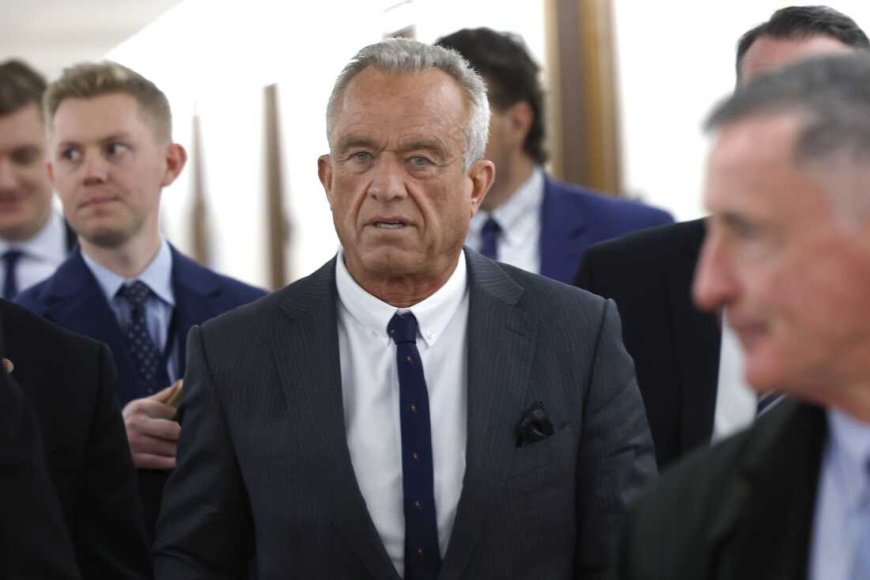RFK Jr.’s Vaccine Retraction Demand: Unpacking the Science-Policy Clash in U.S. Health Debates
RFK Jr. demands the retraction of a major vaccine study, sparking debate between science and politics. Experts weigh in on the implications for U.S. health policy.

Robert F. Kennedy Jr. has once again ignited a fierce debate at the intersection of science and politics. On Friday, August 22, 2025, he formally demanded the retraction of a peer-reviewed vaccine study published earlier this year, arguing that the data used to justify COVID-19 immunization policies was “deeply flawed and misleading.” The move has stirred responses from leading medical journals, public health officials, and grassroots health advocates, creating a fresh wave of controversy in an already polarized national conversation.
The Study at the Center of the Storm
The disputed study, published in a reputable U.S.-based medical journal, examined long-term immune responses in vaccinated populations and concluded that COVID-19 vaccines reduced severe illness and hospitalization risks by more than 80 percent. According to RFK Jr., however, the methodology “overlooked significant variables” and failed to account for adverse reaction data.
Public health authorities, including officials from the Centers for Disease Control and Prevention (CDC), have dismissed his claims. In a written response, a CDC spokesperson reaffirmed that “multiple independent datasets confirm the vaccines’ effectiveness and safety across demographics.”
For many, the clash is less about the science itself and more about who gets to frame the national narrative around health policy.
Journal and Expert Reactions
The medical journal that published the study has stood by its peer-review process but acknowledged receiving RFK Jr.’s formal request. Editors issued a public statement noting that “all published studies remain open to critical evaluation, but extraordinary evidence is required to merit a retraction.”
Dr. Lisa Hampton, an immunologist at Johns Hopkins University, explained in an interview:
“Retractions are rare and usually stem from fraud or undeniable methodological errors. What we see here is not a case of fabricated data but a political figure attempting to leverage scientific debate for policy impact.”
Similarly, the American Medical Association reinforced its position that retracting peer-reviewed research based on political pressure sets a dangerous precedent.
Fact-Check: Breaking Down the Claims
To clarify the dispute, NewsSutra conducted a side-by-side comparison of RFK Jr.’s criticisms against scientific rebuttals provided by leading immunologists:
-
Claim 1: Adverse events were ignored.
Fact-check: Adverse event data was reviewed and published separately through pharmacovigilance systems, not within the main clinical outcomes study. -
Claim 2: Effectiveness exaggerated.
Fact-check: Independent studies in the U.S., U.K., and Israel consistently reported reductions in severe illness above 70%, aligning with the published study’s findings. -
Claim 3: Policy bias influenced publication.
Fact-check: Journals maintain editorial independence, and peer reviewers are anonymized. No evidence has surfaced to suggest policy interference in this study’s publication.
The Broader Science-Policy Divide
RFK Jr.’s demand comes at a politically charged moment. With President Donald Trump reaffirming his support for vaccine access earlier this summer, the Republican administration has sought to move beyond pandemic-era divisions. Kennedy, however, has positioned himself as a contrarian voice, appealing to skeptics who view government-backed health measures with suspicion.
The clash illustrates a deeper rift: whether scientific consensus should directly dictate public policy or whether dissenting interpretations—even when outside the mainstream—should shape national debate.
Public Health Implications
Experts worry that high-profile challenges like Kennedy’s could undermine vaccine confidence at a time when public health systems are already stretched thin. A recent Gallup poll showed that 68% of Americans trust vaccines, a figure down from 81% in 2021.
Grassroots organizations, meanwhile, are working to counter misinformation. The Kaiser Family Foundation’s Vaccine Monitor initiative has become a resource for communities navigating conflicting claims, emphasizing transparency in science communication.
For everyday Americans, the real-world impact is simple: disputes at the top levels of politics and science can influence whether parents decide to vaccinate their children or whether local governments fund immunization drives.
Looking Ahead
The journal in question has not yet ruled on RFK Jr.’s retraction demand. Legal experts suggest the matter could linger for months, as editorial boards weigh both scientific evidence and the broader implications of their decision.
Diplomatic observers note that this clash could also affect U.S. credibility abroad. Countries that once relied on American health guidance during the pandemic may now question whether domestic political battles are undermining science-based policy.
For now, the controversy underscores a defining challenge of the digital age: when scientific research becomes political ammunition, truth itself risks being overshadowed by narrative control.











